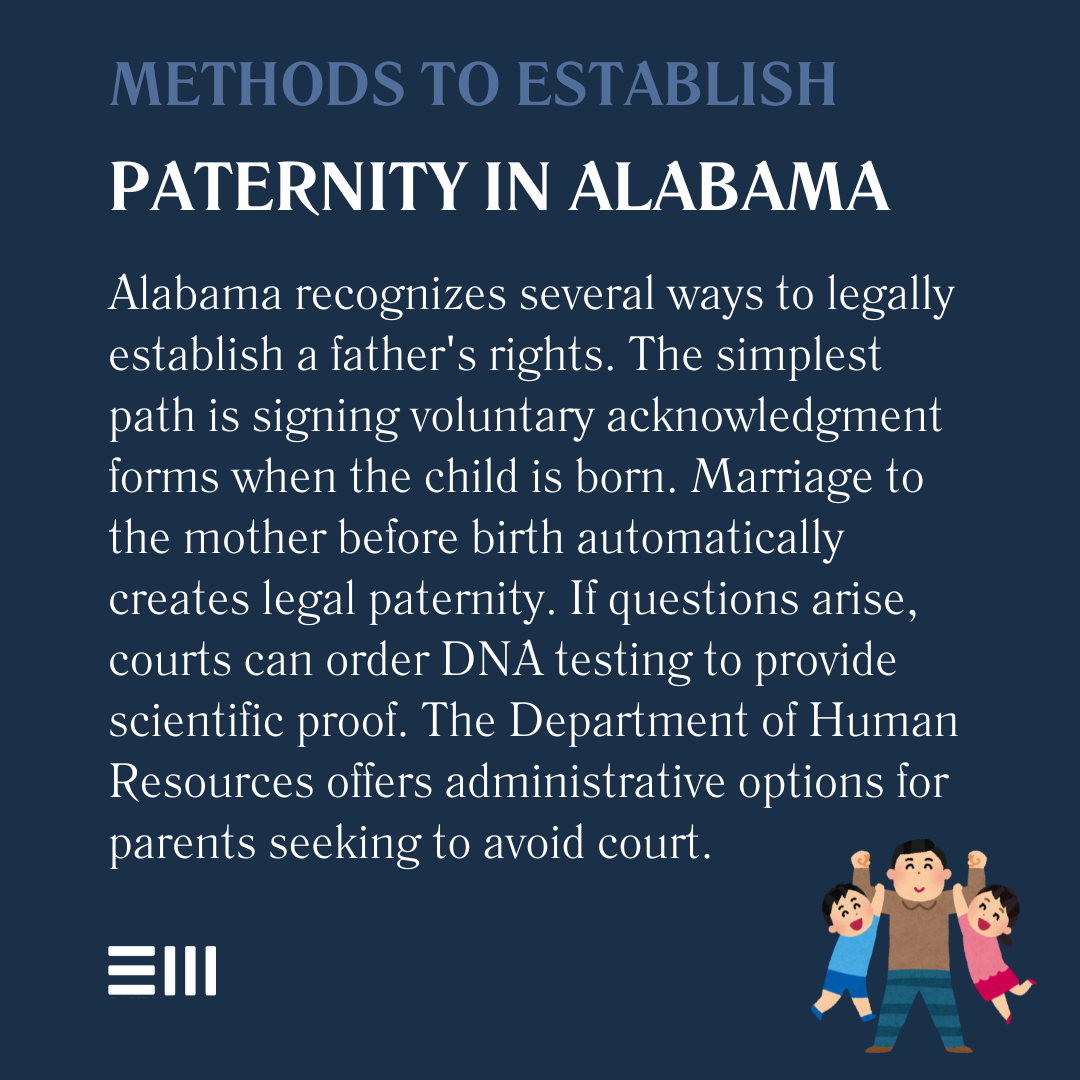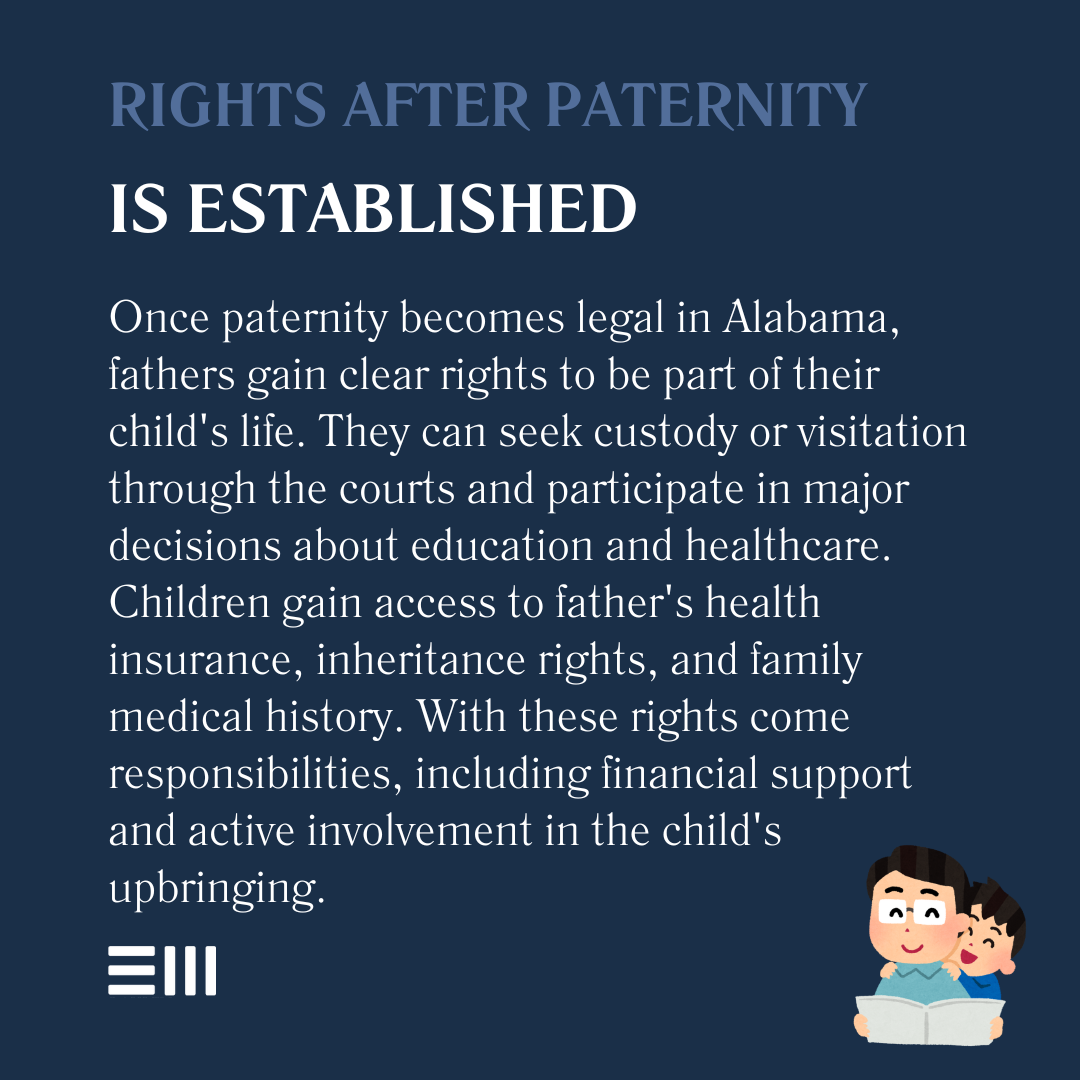Behind closed doors in Alabama courtrooms, lives change forever as judges strike their gavels, establishing or challenging the bonds between fathers and children.
Each day, paternity cases reshape families, determine futures, and establish lifelong connections.
Whether seeking to prove parenthood or dispute claims, understanding Alabama's paternity laws can mean the difference between maintaining or losing vital family relationships.
From Birmingham to Mobile, Montgomery to Huntsville, these cases shape the fabric of Alabama families, creating legal certainty where uncertainty once prevailed.
The Role of Paternity in Alabama Family Law
Establishing paternity in Alabama extends far beyond a simple DNA test. The legal process touches every aspect of the parent-child relationship, from basic rights to long-term responsibilities.
- Legal paternity grants fathers the right to seek custody and visitation with their children;
- Children gain access to family medical history, inheritance rights, and potential benefits;
- Courts can order child support only after paternity is legally established;
- Social Security, veteran's benefits, and health insurance often depend on proven paternity;
- Both parents gain legal standing for education and medical decisions; and
- Emotional bonds receive legal protection through established paternity.
The establishment of paternity creates a foundation for lasting family relationships and legal protections.
Methods of Establishing Paternity in Alabama
Alabama provides several paths to establish legal paternity, each suited to different family situations and circumstances.
Understanding these options helps families choose the most appropriate method for their situation.
- Voluntary acknowledgment through signed forms at birth or later, requiring proper witnessing and notarization;
- Marriage to the mother before the child's birth automatically establishes paternity under Alabama law;
- DNA testing ordered by the court or agreed upon by both parties, following strict chain of custody requirements;
- Administrative procedures through Alabama's Department of Human Resources, offering a non-judicial option;
- Court petitions filed by either parent or the child's guardian, initiating formal legal proceedings;
- Legal presumption of paternity in certain circumstances, such as cohabitation during conception;
- Adoption of the child by the father while married to the mother;
- Recognition through consistent actions and support over time;
- Interstate registration of paternity from other states; and
- Posthumous determination in cases involving inheritance.
Each method carries different legal implications and levels of certainty for all parties involved, requiring careful consideration of timing and circumstances.
Rights and Responsibilities After Paternity Establishment
Once paternity is legally established, both parents assume specific legal obligations and privileges that shape their relationship with the child.
- Rights to pursue custody or visitation arrangements through Alabama courts;
- Obligation to provide financial support for the child based on Alabama guidelines;
- Access to medical records and decision-making authority for healthcare choices;
- Legal standing in educational matters, including school choice and special education decisions;
- Right to inheritance for the child from both paternal and maternal lines;
- Ability to claim the child on insurance policies and tax returns;
- Voice in major life decisions affecting the child's welfare;
- Right to contest adoption proceedings or other legal actions;
- Authority to travel with the child within legal boundaries;
- Access to religious and cultural decision-making;
- Responsibility for educational and medical expenses;
- Rights regarding relocation and geographic moves;
- Input on name changes and identity documents; and
- Participation in legal proceedings affecting the child.
These rights come with corresponding responsibilities that courts expect parents to fulfill consistently and in the child's best interest.
Common Challenges in Paternity Cases
Navigating paternity cases often involves addressing complex legal and personal challenges.
- Time limitations for contesting or establishing paternity;
- Interstate jurisdiction issues when parents live in different states;
- Questions about the accuracy of DNA testing;
- Emotional impact on children during proceedings;
- Coordination with child support enforcement;
- Privacy concerns during legal proceedings;
- Impact on existing family relationships; and
- Financial implications of testing and legal procedures.
Understanding these challenges helps families prepare for the legal process ahead.
Frequently Asked Questions About Paternity in Alabama
Paternity cases often raise specific questions about rights, procedures, and outcomes in Alabama.
Here are detailed answers to common concerns:
How Long Does a Paternity Case Take in Alabama?
Simple uncontested cases might resolve in weeks, while disputed cases can take several months, depending on court schedules and testing requirements. Factors like service of process, scheduling conflicts, and required notices can affect timing.
What if the Mother Refuses a Paternity Test?
Courts can order mandatory testing if there's sufficient reason to establish paternity. Refusing a court-ordered test may result in legal consequences, including contempt of court charges or adverse findings.
Can Paternity Be Challenged After Acknowledgment?
Alabama allows limited time periods to challenge voluntary acknowledgment, typically within 60 days unless fraud is proven. After this period, challenging paternity becomes significantly more difficult and requires specific legal grounds.
Who Pays for Paternity Testing?
The court decides who bears testing costs, often dividing expenses between parties or assigning them to the requesting party. Some state programs may assist with costs for low-income participants.
What Rights Does a Father Have Before Paternity is Established?
Unmarried fathers have limited legal rights until paternity is established through proper legal channels. However, they may take steps to preserve their rights while establishing paternity.
How Does Paternity Affect Child Support?
Child support obligations typically begin from the date of paternity establishment, though courts may order retroactive support in some cases.
Can a Minor Father Establish Paternity?
Minor fathers can establish paternity but may need adult representation in legal proceedings.
What if the Father Lives Outside Alabama?
Interstate paternity cases follow the Uniform Interstate Family Support Act, allowing for coordination between states.
Building Your Future Through Legal Clarity
Every paternity case presents unique challenges and opportunities. Our experienced Alabama family law attorneys understand the sensitive nature of these proceedings and can guide you through each step with professionalism and care.
Your family's future deserves the protection that comes from proper legal representation.
Contact us today for a confidential consultation about your paternity case. We'll help you understand your rights, protect your interests, and secure your family's future through proper legal channels.
Let our experience guide you through this important legal process confidently and clearly.


